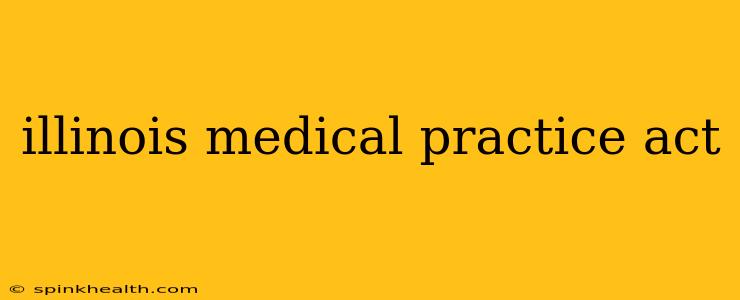The Illinois Medical Practice Act, a cornerstone of healthcare regulation in the state, governs the licensing, practice, and ethical conduct of medical professionals. This intricate legal framework ensures patient safety and maintains the integrity of the medical profession. Understanding its nuances is crucial for both medical practitioners and the public alike. Let's embark on a journey to decipher its complexities, starting with its fundamental purpose.
What is the Purpose of the Illinois Medical Practice Act?
The primary goal of the Illinois Medical Practice Act is to protect the public's health and safety. It achieves this by establishing stringent standards for medical licensure, outlining the scope of practice for various healthcare providers, and detailing the ethical responsibilities expected of them. Think of it as the rulebook for medical practice in Illinois, ensuring accountability and promoting high-quality care. This act isn't just about regulations; it’s about cultivating a culture of trust and responsibility within the medical community.
Who Does the Illinois Medical Practice Act Apply To?
This isn't just for doctors! The Illinois Medical Practice Act encompasses a wide range of healthcare professionals, including but not limited to:
- Physicians (MDs and DOs): The most commonly associated group, this act dictates their licensing, continuing medical education requirements, and disciplinary processes.
- Physician Assistants (PAs): PAs operate under the supervision of physicians, and this act outlines their scope of practice and collaborative relationships.
- Advanced Practice Registered Nurses (APRNs): Including certified nurse midwives, clinical nurse specialists, certified registered nurse anesthetists, and nurse practitioners, the Act details their licensing and practice parameters.
- Other healthcare professionals: While the act primarily focuses on the above, it can indirectly influence the practices of other allied health professionals working alongside licensed medical practitioners.
Essentially, anyone providing medical care within the state needs to be aware of and compliant with the act’s regulations.
What are the Requirements for Obtaining a Medical License in Illinois?
Securing a medical license in Illinois is a rigorous process. Applicants must meet several criteria, including:
- Graduation from an accredited medical school: This ensures a minimum level of education and training.
- Successful completion of USMLE (United States Medical Licensing Examination) or COMLEX (Comprehensive Osteopathic Medical Licensing Examination): These standardized exams evaluate medical knowledge and skills.
- Completion of an accredited residency or fellowship program: Practical experience under supervision is crucial before independent practice.
- Passing the Illinois medical licensing exam: This specifically assesses the applicant's knowledge of Illinois laws and regulations.
- Background checks and fingerprinting: Ensuring the safety of patients requires rigorous background checks.
What Happens if a Doctor Violates the Illinois Medical Practice Act?
Violations of the Illinois Medical Practice Act can lead to a range of consequences, including:
- License suspension or revocation: The most severe penalty, this removes a physician's ability to practice medicine.
- Fines: Monetary penalties can be levied for less serious infractions.
- Probation: This allows a physician to continue practicing under strict supervision and conditions.
- Mandatory continuing education: Addressing specific deficiencies in practice through further training.
- Censure: A formal reprimand from the Illinois Department of Financial and Professional Regulation (IDFPR).
How Can I File a Complaint Against a Medical Professional in Illinois?
If you believe a medical professional has violated the Illinois Medical Practice Act, you can file a complaint with the IDFPR. The process typically involves providing detailed documentation of the alleged violation. The IDFPR then investigates the complaint and takes appropriate action if a violation is substantiated. Remember, documenting everything is key in this process.
Where Can I Find More Information About the Illinois Medical Practice Act?
The most reliable source of information is the official website of the Illinois Department of Financial and Professional Regulation (IDFPR). Their website provides access to the full text of the Act, FAQs, and contact information for filing complaints or seeking clarification.
This overview provides a general understanding of the Illinois Medical Practice Act. For detailed legal advice, it is crucial to consult with a legal professional specializing in medical law. The complexity of this act necessitates expert guidance for both practitioners and the public. Remember, protecting patient safety and upholding the integrity of the medical profession are the guiding principles behind this vital legal framework.

